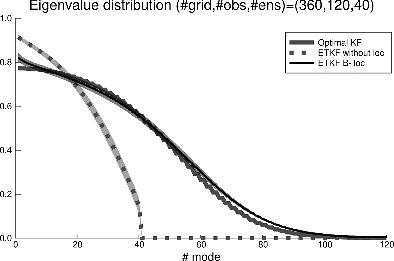当前位置:
X-MOL 学术
›
Q. J. R. Meteorol. Soc.
›
论文详情
Our official English website, www.x-mol.net, welcomes your
feedback! (Note: you will need to create a separate account there.)
Why does EnKF suffer from analysis overconfidence? An insight into exploiting the ever‐increasing volume of observations
Quarterly Journal of the Royal Meteorological Society ( IF 3.0 ) Pub Date : 2020-12-27 , DOI: 10.1002/qj.3970 Daisuke Hotta 1, 2, 3 , Yoichiro Ota 2, 4
Quarterly Journal of the Royal Meteorological Society ( IF 3.0 ) Pub Date : 2020-12-27 , DOI: 10.1002/qj.3970 Daisuke Hotta 1, 2, 3 , Yoichiro Ota 2, 4
Affiliation

|
Ensemble Kalman filters (EnKF) are empirically known to suffer from insufficient posterior spread and this issue is aggravated when assimilating a large volume of observations. This problem, commonly called analysis underdispersion or analysis overconfidence, has been well recognized, but why it occurs seems to be rather poorly understood. Inspired by the theory of the degrees of freedom for signal, this article investigates this problem by analyzing the trace of the matrix HK, where H and K represent, respectively, the observation operator and the gain matrix. A simple mathematical argument shows that tr HK for EnKF is bounded from above by the ensemble size, which entails that assimilating many more observations than the ensemble size leads automatically to tr HK underestimation, as long as the observations are of accuracy comparable to the background. Since tr HK can be interpreted as the squared spread of the posterior ensemble measured in the normalized observation space, underestimated tr HK implies overconfidence in the analysis spread, which, in a cycled context, requires covariance inflation to be applied. The theory is then extended to cases where covariance localization schemes (either B‐localization or R‐localization) are applied to show how they alleviate the analysis underdispersion. These findings from the mathematical argument are demonstrated with a simple one‐dimensional covariance model. Finally, the findings described above are used to form speculative arguments about how to interpret several puzzling features of the local ensemble transform Kalman filter (LETKF) previously reported in the literature, such as why using fewer observations can lead to better performance, when optimal localization scales tend to occur, and why covariance inflation methods based on the relaxation to prior information approach are particularly successful when observations are distributed inhomogeneously.
中文翻译:

EnKF为什么会遭受分析过度自信的困扰?对利用不断增加的观测量的见解
经验表明,集合卡尔曼滤波器(EnKF)的后扩散不充分,并且在吸收大量观测值时,这个问题会更加严重。这个问题通常被称为分析分散不足或分析过度自信,这一点已经得到了很好的认识,但是为什么它出现的原因似乎却知之甚少。受信号自由度理论的启发,本文通过分析矩阵HK的轨迹来研究此问题,其中H和K分别代表观测算子和增益矩阵。一个简单的数学论证表明,tr HK因为EnKF从上方受集合大小的限制,这意味着吸收比集合大小更多的观测值会自动导致tr HK低估,只要观测值的准确性与背景相当即可。由于tr HK可以解释为在标准化观测空间中测量的后集合的平方扩展,因此低估了tr HK表示对分析范围过于自信,在循环情况下,需要应用协方差膨胀。然后将该理论扩展到使用协方差本地化方案(B本地化或R本地化)以显示它们如何缓解分析分散不足的情况。通过简单的一维协方差模型可以证明这些来自数学论证的发现。最后,上述发现被用来形成关于如何解释先前文献中报道的局部整体变换卡尔曼滤波器(LETKF)的几个令人费解的特征的推测性论据,例如,当最佳定位时,为什么使用较少的观测值可以导致更好的性能容易出现水垢,
更新日期:2021-03-07
中文翻译:

EnKF为什么会遭受分析过度自信的困扰?对利用不断增加的观测量的见解
经验表明,集合卡尔曼滤波器(EnKF)的后扩散不充分,并且在吸收大量观测值时,这个问题会更加严重。这个问题通常被称为分析分散不足或分析过度自信,这一点已经得到了很好的认识,但是为什么它出现的原因似乎却知之甚少。受信号自由度理论的启发,本文通过分析矩阵HK的轨迹来研究此问题,其中H和K分别代表观测算子和增益矩阵。一个简单的数学论证表明,tr HK因为EnKF从上方受集合大小的限制,这意味着吸收比集合大小更多的观测值会自动导致tr HK低估,只要观测值的准确性与背景相当即可。由于tr HK可以解释为在标准化观测空间中测量的后集合的平方扩展,因此低估了tr HK表示对分析范围过于自信,在循环情况下,需要应用协方差膨胀。然后将该理论扩展到使用协方差本地化方案(B本地化或R本地化)以显示它们如何缓解分析分散不足的情况。通过简单的一维协方差模型可以证明这些来自数学论证的发现。最后,上述发现被用来形成关于如何解释先前文献中报道的局部整体变换卡尔曼滤波器(LETKF)的几个令人费解的特征的推测性论据,例如,当最佳定位时,为什么使用较少的观测值可以导致更好的性能容易出现水垢,











































 京公网安备 11010802027423号
京公网安备 11010802027423号